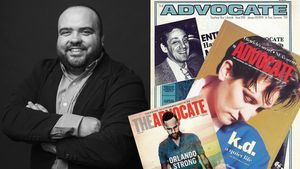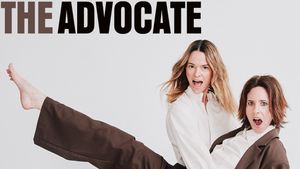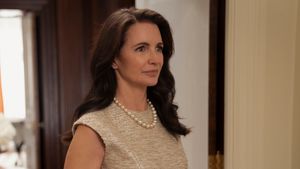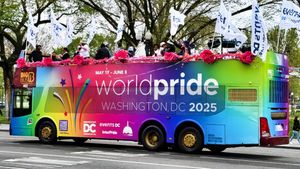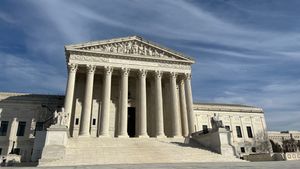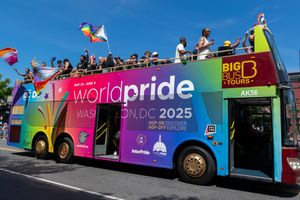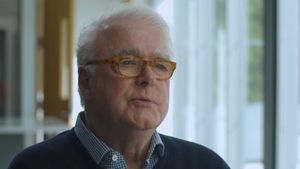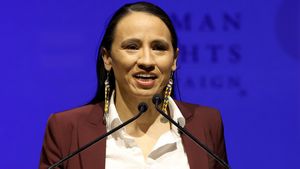The Supreme Court Monday will hear an important LGBTQ+ rights case, 303 Creative v. Elenis, which turns on the question of whether a business owner has the right to turn away same-sex couples because of her beliefs about the nature of marriage.
Lorie Smith, owner of 303 Creative LLC in Colorado, wants to expand her wedding business but says serving same-sex couples would violate her conservative Christian beliefs and her free speech rights. She filed suit in 2016 challenging Colorado’s LGBTQ-inclusive nondiscrimination law. She lost at the federal district court and appeals court levels. The Supreme Court agreed in February to hear her case but only on the free speech claim.
Elenis is Aubrey Elenis, director of the Colorado Civil Rights Division, which enforces the state’s antidiscrimination law. Smith filed her case before the state attempted to enforce the law against her. No state agency has ever investigated her, officials said in court filings, and it appears she’s never been asked to create a wedding site for a same-sex couple.
There is a “common-law tradition” of requiring businesses to serve all customers without discrimination, Colorado Solicitor General Eric Olson wrote in a brief to the Supreme Court. “Allowing a business to refuse service because of who these customers are would break from this tradition and deny them full participation in the marketplace,” he said.
Smith, meanwhile, contends that applying the antidiscrimination law would force her to create messages that go against her beliefs. She is represented by the Alliance Defending Freedom, an anti-LGBTQ+ legal nonprofit. The ADF also represented Colorado baker Jack Phillips, who in 2018 won a measured victory at the high court.
Phillips, owner of Masterpiece Cakeshop, had refused to create a custom wedding cake for a same-sex couple, and the Colorado Civil Rights Commission found that he had violated the state’s antidiscrimination law. The Supreme Court vacated the commission’s judgment against him, saying commissioners had shown bias against his religious beliefs, but it did not establish a broad right to discriminate.
Last year, in another case on the right to discriminate against LGBTQ+ people, the court ruled unanimously in favor of Catholic Social Services, which had refused to certify same-sex or unmarried couples as foster parents, even in its work under contract to the city of Philadelphia. The city revoked the contract because the Catholic agency violated its antidiscrimination law.
The agency sued in federal court and lost at the trial court and appeals court levels, but the Supreme Court, including the liberal justices, ruled in the agency’s favor because of an exception in its contract. Again, the court did not create a general right to discriminate.
In 2020, in cases that did not involve LGBTQ+ people but have implications for them, the court ruled in favor of religious employers’ right to discriminate in certain situations. In one case, it ruled that federal antidiscrimination laws do not apply to teachers at church-sponsored schools if instruction in religion is part of their jobs. In another, it ruled that faith-based employers can deny birth control coverage to workers despite the Affordable Care Act’s mandate for such coverage.
With this history of expanding religious exemptions, the court may be disposed to rule in Smith’s favor, but these things are hard to predict. After all, Justice Neil Gorsuch, appointed by Donald Trump, wrote the 2020 Bostock ruling, in which the court decreed that anti-LGBTQ+ job discrimination is illegal (the 2020 religious exemptions rulings came later).
But Gorsuch was only Trump’s first appointee to the high court. Two others, Brett Kavanaugh and Amy Coney Barrett, have joined him, giving the court a 6-3 conservative majority. Kavanaugh was on the court at the time of Bostock, while Barrett was confirmed a few months after the ruling, replacing Ruth Bader Ginsburg, who died in 2020. Neither Kavanaugh nor Barrett was a justice at the time of the Masterpiece Cakeshop ruling.
There has been a call for Barrett to recuse herself from the 303 Creative case because of her reported affiliation with an anti-LGBTQ+ religious group called People of Praise. Barrett has never publicly confirmed that she belonged to the group, but she was once a trustee of private schools it runs, and those schools have made clear that LGBTQ+ employees are not welcome, nor are children of LGBTQ+ parents. But Barrett has not recused herself.
Perhaps the most scrutinized justice, though, will be Clarence Thomas. When the court overturned Roe v. Wade in its Dobbs v. Jackson Women’s Health Organization ruling in June, Thomas urged for his colleagues to overturn rulings on same-sex marriage and intimacy as well as the right to use contraception — if a case on any of these issues comes before the court, which none has yet. But his hostility to LGBTQ+ rights is clear.
As the hearings took place Monday, the Human Right Campaign said that the case could to two things: better protect vulnerable groups from discrimination or allow businesses to openly discriminate toward certain groups.
“If a business is open on main street, it must be open to everyone, regardless of who they are or whom they love. At its core, this case is a cynical effort to manipulate the First Amendment in order to provide a license to discriminate against LGBTQ+ people and our families. A business owner's personal beliefs should never be reason enough to discriminate against a customer,” HRC's legal director Sarah Warbelow said in a statement.


